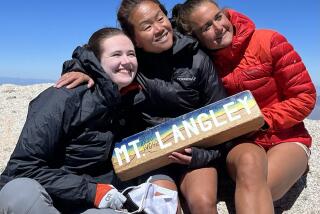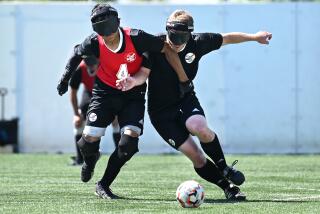Not Along for the Ride : Evangelatos Shifts Gears to Cycling After Winning Ski Event in Paralympics
- Share via
Greg Evangelatos has come far in the 12 years since that horrible night when his homemade firework exploded in his face near his Encino home, leaving him blind. He made it to college and brought his life back to a normal level.
He won a gold medal in skiing in the Paralympic Games in Albertville, France, this year and is currently in Spain, hoping to win one or two more gold medals when he races a tandem bike through the streets and over the cycling tracks of Barcelona in the Paralympics.
He has only one complaint about the way his life is going: He wishes all these guys would stop touching his thigh.
Explanation: Evangelatos and his sighted cycling teammate, Liz Heller of St. Louis, had to work out an intricate set of touch signals during races against fully sighted teams, when to sprint, when to ease, when to try a breakaway. Sighted teams use subtle hand signals. Evangelatos and Heller were forced into a system in which Heller reaches back and taps the leg of Evangelatos when it is time to make a move.
Other riders quickly picked up on the signals. And now, when Evangelatos, 30, and Heller, 33, race, other riders streak quietly up alongside them, reach out and tap Evangelatos’ leg, sending the half-blind team into a frenzy as Evangelatos, thinking it was Heller tapping, explodes off the seat into a standing position and into a sprint as the eyes of the startled Heller flash widely and she tries to rein in this pedaling maniac seated behind her.
Of course, it’s their own fault. None of this would have happened if Evangelatos and Heller had not started doing so well in these races during the summer. Late in July the team finished second in the National Tandem championships in Spokane, Wash., and once that happened, they became fair game in the intensely competitive world of cycling.
“At first, when they started stealing our signals and touching my leg, it bothered me,” Evangelatos said. “It still does. But now I tend to think of it more as a compliment. They don’t give me a break because I’m blind, and I love that. These are serious racers. They don’t care if someone is blind or has just one leg. If you’re ahead of them and beating them, they’ll do anything. We’ve become a threat, and now they come after us.
“But I wouldn’t have it any other way.”
Heller thought she had retired from competitive cycling 18 months ago when she completed law school and began working full time for a firm. But Evangelatos tracked her down and talked her into this whirlwind summer.
In any partner or tandem event in the Paralympics, one of the participants is not disabled, and Heller welcomed the opportunity to fill that role for Evangelatos.
“When I heard about him, I couldn’t wait to meet him,” Heller said. “I honestly didn’t expect to get involved in anything as competitive as this, but it has all been worth it. The trip to Barcelona really has me excited.”
Heller said there have been many other obstacles presented by Evangelatos’ blindness in addition to competitors stealing their signals. Some she never would have thought of, she said.
“I learned right away with Greg that he wants to know everything, the hills coming up, the turns, and he wants to know way ahead of time,” she said. “And then there are other things he wants to know. When he hears a dog barking at us during a training ride, he wants to know, for example, whether the dog is behind a fence or not. That’s pretty important to him.”
In several months with Evangelatos, Heller has formed an opinion of him that is rather common.
“Greg is just a remarkable guy,” she said.
Evangelatos has worked hard to reach this level, both in sports and in his life. In the days and weeks and months and even years after the explosion nearly killed him, he struggled. He asked why. Today, he still wonders why such a thing happened. But he is, every day, accepting it more readily.
“I will be continually adjusting to this life,” he said. “There will never be a time in my life when everything is perfect. Sight is something I will always miss. It took me about six or seven years to accept my blindness and move on with my life. But still, today, there is great frustration because I cannot see.”
Mostly, he said, it is the dependence on others that irks him. When he wanted to train on his bike, he had to call and find Heller or another training partner. When he had to get a flat tire on his bike fixed, he had to ask a friend for transportation. When he gets mail, he must ask a friend to read it to him.
“The mental adjustment is the difficult part,” he said. “When you lose your eyesight, you lose all of your confidence and self-esteem. Social interaction becomes very difficult. Getting back into the world to meet people and make friends is very difficult.”
Sports, he said, made all the difference. First, he learned how to ski. He became obsessed with that sport and rode the obsession and natural ability to the Winter Paralympics gold medal in the giant slalom in April in Albertville. And now it is cycling, a sport he dabbled in for the last six or seven years, that has become an obsession. The Paralympic cycling events will begin Saturday in Barcelona.
“Sports has allowed me and many blind people to live a healthier and more physical life and to build back the self-confidence we had lost,” he said. “More than anything else, sports has made the difference in my life. It has helped me so much. It has, really, saved me.”
The saving commenced daily just after dawn as Evangelatos and Heller mounted their tandem bike and headed for the hills around St. Louis, where he lived and trained for the past four months. Each Saturday, Sunday and Wednesday, the team cranked out a fast-paced 60- or 70-mile workout. Other days brought 30-mile training rides. In the afternoons, Evangelatos swam or lifted weights, working his 5-foot-8, 149-pound body into racing form.
With all of the spare time that 60-hour training weeks left him, Evangelatos pounded away at other difficult pursuits. Algebra and geometry. He will return this year to Cal State Dominguez Hills where he has an on-campus apartment and is working toward a business degree. Algebra and geometry have been his summer courses.
“Geometry has been a monster,” he said. “It has really tested my ability to focus and deal with pictures that are only in my head. Imagine all those angles and triangles and being able only to develop those diagrams in your mind. I think if I had been forced to take one more algebra or geometry test this summer, I would have snapped. I would have thrown the books right out the window.
“But I made it. I survived it.”
And, he said, it made him look forward to the long and often brutal training sessions on the bicycle and to the half-dozen races he and Heller have participated in since May. The physical pain of training became a relief to the mental strain of Braille textbooks.
During races, Evangelatos figures he has at least one advantage over the unimpaired. The adrenaline rush he gets flying downhill at 55 m.p.h. without a clue as to what is in front of him makes the grueling work of pedaling much easier.
“Even downhill, I’m pedaling to get more speed,” he said. “The thrill of going fast is overwhelming. The excitement is hard to describe. I love it. But a quick turn is still spooky. Let’s say I clench the handlebars tighter than the other racers. Not being able to see a curve coming and not being able to anticipate a quick change in direction, that’s the rush.”
There are other things Evangelatos misses too.
“I wish I could see all of my friends,” he said. “I miss that very, very much.”
More to Read
Go beyond the scoreboard
Get the latest on L.A.'s teams in the daily Sports Report newsletter.
You may occasionally receive promotional content from the Los Angeles Times.






